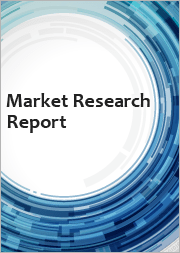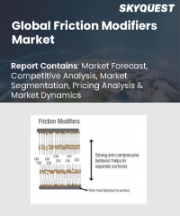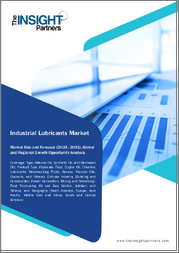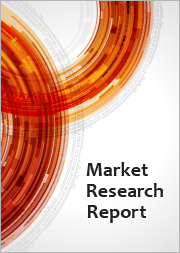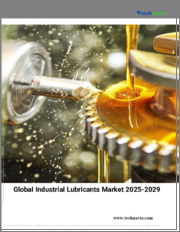
|
시장보고서
상품코드
1527279
산업용 윤활유 시장 규모 조사 : 제품별, 용도별, 지역별 예측(2022-2032년)Global Industrial Lubricants Market Size study, by Product, by Application and Regional Forecasts 2022-2032 |
||||||
세계의 산업용 윤활유 시장은 2023년 약 552억 4,000만 달러로 평가되었고, 2024년부터 2032년까지 연평균 복합 성장률(CAGR) 3.9%로 성장할 전망이며, 2032년에는 743억 달러 규모에 도달할 것으로 예측됩니다.
산업용 윤활유는 광범위한 산업 분야에서 기계 부품 사이의 마찰, 마모 및 열을 줄이는 데 필수적입니다. 금속 간의 직접 접촉을 최소화하고, 녹과 부식을 방지하고, 열을 발산시켜 기계의 성능과 수명을 향상시킵니다. 일반적인 산업용 윤활유에는 오일, 그리스, 페이스트가 있으며, 각각 유압 시스템, 기어박스, 베어링, 체인 등 특정 용도에 적합합니다.
개발도상국의 급속한 산업화 및 무역활동 증가가 산업용 윤활유 수요를 촉진하고 있습니다. 연구개발 투자 증가와 적절한 판매 경로 확대가 주요 시장 기업의 성장을 뒷받침하고 있습니다. 비전통적인 에너지, 화학, 광업 등의 산업은 큰 성장이 예상되고 컴프레서, 유압, 산업용 엔진, 원심분리기, 베어링 등의 용도에 있어서의 산업용 윤활유 수요를 더욱 밀어 올리고 있습니다. 또한 완제품 수요 증가에 대응하기 위해 생산 공정을 자동화하고 생산 능력을 확대하기 위해 제조업체는 점점 더 기계에 의존하고 있습니다. 배출 기준의 진화, 엔진 기술의 향상, 중국이나 인도 등의 신흥국에 있어서의 이산화탄소 배출량 감축을 위한 규범이라고 하는 대처가, 예측 기간에 있어서 시장의 주된 촉진요인입니다.
소비자의 라이프스타일 변화와 서양의 생활수준 채용으로 가공식품과 냉동식품 수요가 증가하고 있습니다. 포장 라인의 자동화와 로봇 공학에 의한 고압 작업에의 적응이 가공 식품 시장의 성장을 가속할 것으로 예상됩니다. 농산물 가공의 중요성이 높아지고 있는 것도 업계의 추가 발전을 촉진할 것으로 예상됩니다. 그러나 합성 윤활유로 인한 오염과 환경 오염에 대한 우려 증가와 엄격한 규제, 심지어 사용한 윤활유의 폐기와 관련된 문제는 시장 성장에 큰 어려움을 겪고 있습니다. 윤활유에 사용되는 대부분의 첨가제는 석유화학 유도체이며 수질 오염에 심각한 위협이 되고 있습니다. 윤활유의 사용, 폐기 및 재활용에 대한 환경 문제 증가는 시장 성장을 억제할 가능성이 높습니다.
세계의 산업용 윤활유 시장 조사에서 고려한 주요 지역은 아시아태평양, 북미, 유럽, 라틴아메리카 및 기타 지역입니다. 아시아태평양은 2023년에 44.1%라는 최대의 수익 점유율을 차지하며 인도, 인도네시아, 태국, 말레이시아 등 신흥 경제권에서 확립된 최종 이용 산업이 견인해 2024년부터 2032년까지 4.0% 초과하는 가장 빠른 CAGR이 예상됩니다. 윤활제 도포 후 산업용 기기의 가동 효율 향상에 대한 의식이 높아지면서 이 지역 수요를 촉진할 것으로 예상됩니다. 북미와 유럽의 산업용 윤활유 수요는 산업 성장이 상대적으로 정체되어 있음에도 불구하고 높은 수준을 유지할 것으로 예상됩니다. 굴착 및 탐사 활동에 의한 유전용 화학제품 수요 증가가 북미 시장의 성장을 가속할 것으로 예상됩니다. 산업활동의 부활은 산업기계의 근대화와 함께 예측기간에 있어서 유럽의 산업용 윤활유 수요를 결정하는 중요한 촉진요인이 되고 있습니다.
목차
제1장 세계의 산업용 윤활유 시장 : 주요 요약
- 세계의 산업용 윤활유 시장 규모 및 예측(2022-2032년)
- 지역별 개요
- 부문별 개요
- 제품별
- 용도별
- 주요 동향
- 경기 후퇴의 영향
- 애널리스트의 결론 및 제안
제2장 세계의 산업용 윤활유 시장 정의 및 조사의 전제조건
- 조사 목적
- 시장의 정의
- 조사의 전제조건
- 포함과 제외
- 제한 사항
- 공급측 분석
- 가용성
- 인프라
- 규제 환경
- 시장 경쟁
- 경제성(소비자의 시점)
- 수요측 분석
- 규제 프레임워크
- 기술의 진보
- 환경에 대한 배려
- 소비자의 의식 및 수용
- 조사 방법
- 조사 대상년도
- 환율 변환율
제3장 세계의 산업용 윤활유 시장 역학
- 시장 성장 촉진요인
- 신흥 국가의 급속한 산업화
- 효율적인 기계 조작에 대한 수요 증가
- 연구개발 투자 증가
- 시장의 과제
- 환경 문제 및 규제
- 사용한 윤활유의 폐기
- 시장 기회
- 신흥 시장의 성장
- 윤활유 배합의 혁신
제4장 세계의 산업용 윤활유 시장 : 산업 분석
- Porter's Five Forces 모델
- 공급기업의 협상력
- 구매자의 협상력
- 신규 진입업자의 위협
- 대체품의 위협
- 경쟁 기업간 경쟁 관계
- Porter's Five Forces 모델에 대한 미래적 접근
- Porter's Five Forces의 영향 분석
- PESTEL 분석
- 정치
- 경제
- 사회
- 기술
- 환경
- 법률
- 주요 투자 기회
- 주요 성공 전략
- 파괴적 동향
- 업계 전문가의 시점
- 애널리스트의 결론 및 제안
제5장 세계의 산업용 윤활유 시장 규모 및 예측 : 제품별(2022-2032년)
- 부문 대시보드
- 세계의 산업용 윤활유 시장 : 제품별 수익 동향 분석(2022년, 2032년)
- 프로세스 오일
- 일반적인 산업용 오일
- 금속가공유
- 공업용 엔진 오일
- 그리스
- 기타
제6장 세계의 산업용 윤활유 시장 규모 및 예측 : 용도별(2022-2032년)
- 부문 대시보드
- 세계의 산업용 윤활유 시장 : 용도별 수익 동향 분석(2022년, 2032년)
- 금속가공
- 섬유
- 에너지
- 화학제조
- 식품가공
- 유압
- 기타
제7장 세계의 산업용 윤활유 시장 규모 및 예측 : 지역별(2022-2032년)
- 북미
- 미국
- 캐나다
- 유럽
- 영국
- 독일
- 프랑스
- 스페인
- 이탈리아
- 기타 유럽
- 아시아태평양
- 중국
- 인도
- 일본
- 호주
- 한국
- 기타 아시아태평양
- 라틴아메리카
- 브라질
- 멕시코
- 기타 라틴아메리카
- 중동 및 아프리카
- 사우디아라비아
- 남아프리카
- 기타 중동 및 아프리카
제8장 경쟁 정보
- 주요 기업의 SWOT 분석
- 주요 시장 전략
- 기업 프로파일
- ExxonMobil Corp
- Fuchs Group
- The Lubrizol Corporation
- Royal Dutch Shell
- Phillips 66
- Lucas Oil Products, Inc.
- Amsoil, Inc.
- Bel-Ray Co., Inc.
- Total SA
- Kluber Lubrication
- Valvoline International, Inc.
- Chevron Corp.
- Clariant
- Quaker Chemical Corp.
- Houghton International, Inc.
제9장 조사 과정
AJY 24.09.06Global Industrial Lubricants Market was valued at approximately USD 55.24 billion in 2023 and is projected to grow at a compound annual growth rate (CAGR) of 3.9% from 2024 to 2032, reaching a market size of USD 74.3 billion by 2032. Industrial lubricants are essential for reducing friction, wear, and heat between mechanical components in a wide range of industrial applications. They enhance machinery performance and lifespan by minimizing direct metal-to-metal contact, preventing rust and corrosion, and dissipating heat. Common types of industrial lubricants include oils, greases, and pastes, each suited for specific uses such as hydraulic systems, gearboxes, bearings, and chains.
The rapid industrialization in developing countries, coupled with a rise in trade activities, is fuelling the demand for industrial lubricants. Rising investments in R&D and proper expansion channels are aiding the growth of key market players. Industries such as unconventional energy, chemicals, and mining are expected to witness significant growth, further boosting the demand for industrial lubricants in applications like compressors, hydraulics, industrial engines, centrifuges, and bearings. Also, manufacturers are increasingly relying on machinery to automate their production processes and expand their production capabilities to meet the rising demand for finished goods. Initiatives like evolving emission standards, improving engine technology, and norms for reducing carbon footprints in emerging economies such as China and India are key driving factors for the market over the forecast period.
Changing consumer lifestyles and the adoption of Western living standards have increased the demand for processed and frozen foods. Packaging line automation and adaptation to high-pressure operations with robotics are expected to foster the growth of the processed foods market. The rising importance of agro-processing is also expected to drive further developments in the industry. However, increasing concerns and stringent regulations over contamination and environmental pollution caused by synthetic lubricants, along with issues related to the disposal of used lubricants, pose significant challenges to market growth. Most additives used in lubricants are petrochemical derivatives, which pose serious threats to water pollution. Rising environmental concerns regarding the use, disposal, and recycling of lubricants are likely to restrain market growth.
Key regions considered for the global industrial lubricants market study include Asia Pacific, North America, Europe, Latin America, and the Rest of the World. Asia Pacific held the largest revenue share of 44.1% in 2023 and is expected to witness the fastest CAGR of over 4.0% from 2024 to 2032, driven by well-established end-use industries in emerging economies such as India, Indonesia, Thailand, and Malaysia. Rising awareness about the greater operating efficiency of industrial equipment after lubricant application is anticipated to fuel demand in the region. Demand for industrial lubricants in North America and Europe is expected to remain at a higher level despite relative stagnancy in industrial growth. Rising demand for oilfield chemicals due to drilling and exploration activities is expected to propel market growth in North America. The resurgence in industrial activities, along with the modernization of industrial machinery, is a key driving factor for determining European industrial lubricant demand over the forecast period.
Major market players included in this report are:
- ExxonMobil Corp
- Fuchs Group
- The Lubrizol Corporation
- Royal Dutch Shell
- Phillips 66
- Lucas Oil Products, Inc.
- Amsoil, Inc.
- Bel-Ray Co., Inc.
- Total S.A.
- Kluber Lubrication
- Valvoline International, Inc.
- Chevron Corp.
- Clariant
- Quaker Chemical Corp.
- Houghton International, Inc.
The detailed segments and sub-segment of the market are explained below:
By Product:
- Process Oils
- General Industrial Oils
- Metalworking Fluids
- Industrial Engine Oils
- Greases
- Others
By Application:
- Metalworking
- Textiles
- Energy
- Chemical Manufacturing
- Food Processing
- Hydraulic
- Others
By Region:
- North America
- U.S.
- Canada
- Europe
- UK
- Germany
- France
- Spain
- Italy
- ROE
- Asia Pacific
- China
- India
- Japan
- Australia
- South Korea
- RoAPAC
- Latin America
- Brazil
- Mexico
- Middle East & Africa
- Saudi Arabia
- South Africa
- RoMEA
Years considered for the study are as follows:
- Historical year - 2022
- Base year - 2023
- Forecast period - 2024 to 2032
Key Takeaways:
- Market Estimates & Forecast for 10 years from 2022 to 2032.
- Annualized revenues and regional level analysis for each market segment.
- Detailed analysis of geographical landscape with Country level analysis of major regions.
- Competitive landscape with information on major players in the market.
- Analysis of key business strategies and recommendations on future market approach.
- Analysis of competitive structure of the market.
- Demand side and supply side analysis of the market.
Table of Contents
Chapter 1. Global Industrial Lubricants Market Executive Summary
- 1.1. Global Industrial Lubricants Market Size & Forecast (2022- 2032)
- 1.2. Regional Summary
- 1.3. Segmental Summary
- 1.3.1. By Product
- 1.3.2. By Application
- 1.4. Key Trends
- 1.5. Recession Impact
- 1.6. Analyst Recommendation & Conclusion
Chapter 2. Global Industrial Lubricants Market Definition and Research Assumptions
- 2.1. Research Objective
- 2.2. Market Definition
- 2.3. Research Assumptions
- 2.3.1. Inclusion & Exclusion
- 2.3.2. Limitations
- 2.3.3. Supply Side Analysis
- 2.3.3.1. Availability
- 2.3.3.2. Infrastructure
- 2.3.3.3. Regulatory Environment
- 2.3.3.4. Market Competition
- 2.3.3.5. Economic Viability (Consumer's Perspective)
- 2.3.4. Demand Side Analysis
- 2.3.4.1. Regulatory frameworks
- 2.3.4.2. Technological Advancements
- 2.3.4.3. Environmental Considerations
- 2.3.4.4. Consumer Awareness & Acceptance
- 2.4. Estimation Methodology
- 2.5. Years Considered for the Study
- 2.6. Currency Conversion Rates
Chapter 3. Global Industrial Lubricants Market Dynamics
- 3.1. Market Drivers
- 3.1.1. Rapid Industrialization in Developing Countries
- 3.1.2. Rising Demand for Efficient Machinery Operation
- 3.1.3. Increasing Investments in R&D
- 3.2. Market Challenges
- 3.2.1. Environmental Concerns and Regulations
- 3.2.2. Disposal of Used Lubricants
- 3.3. Market Opportunities
- 3.3.1. Growth in Emerging Markets
- 3.3.2. Innovations in Lubricant Formulations
Chapter 4. Global Industrial Lubricants Market Industry Analysis
- 4.1. Porter's 5 Force Model
- 4.1.1. Bargaining Power of Suppliers
- 4.1.2. Bargaining Power of Buyers
- 4.1.3. Threat of New Entrants
- 4.1.4. Threat of Substitutes
- 4.1.5. Competitive Rivalry
- 4.1.6. Futuristic Approach to Porter's 5 Force Model
- 4.1.7. Porter's 5 Force Impact Analysis
- 4.2. PESTEL Analysis
- 4.2.1. Political
- 4.2.2. Economical
- 4.2.3. Social
- 4.2.4. Technological
- 4.2.5. Environmental
- 4.2.6. Legal
- 4.3. Top investment opportunity
- 4.4. Top winning strategies
- 4.5. Disruptive Trends
- 4.6. Industry Expert Perspective
- 4.7. Analyst Recommendation & Conclusion
Chapter 5. Global Industrial Lubricants Market Size & Forecasts by Product 2022-2032
- 5.1. Segment Dashboard
- 5.2. Global Industrial Lubricants Market: Product Revenue Trend Analysis, 2022 & 2032 (USD Billion)
- 5.2.1. Process Oils
- 5.2.2. General Industrial Oils
- 5.2.3. Metalworking Fluids
- 5.2.4. Industrial Engine Oils
- 5.2.5. Greases
- 5.2.6. Others
Chapter 6. Global Industrial Lubricants Market Size & Forecasts by Application 2022-2032
- 6.1. Segment Dashboard
- 6.2. Global Industrial Lubricants Market: Application Revenue Trend Analysis, 2022 & 2032 (USD Billion)
- 6.2.1. Metalworking
- 6.2.2. Textiles
- 6.2.3. Energy
- 6.2.4. Chemical Manufacturing
- 6.2.5. Food Processing
- 6.2.6. Hydraulic
- 6.2.7. Others
Chapter 7. Global Industrial Lubricants Market Size & Forecasts by Region 2022-2032
- 7.1. North America Industrial Lubricants Market
- 7.1.1. U.S. Industrial Lubricants Market
- 7.1.1.1. Product breakdown size & forecasts, 2022-2032
- 7.1.1.2. Application breakdown size & forecasts, 2022-2032
- 7.1.2. Canada Industrial Lubricants Market
- 7.1.1. U.S. Industrial Lubricants Market
- 7.2. Europe Industrial Lubricants Market
- 7.2.1. U.K. Industrial Lubricants Market
- 7.2.2. Germany Industrial Lubricants Market
- 7.2.3. France Industrial Lubricants Market
- 7.2.4. Spain Industrial Lubricants Market
- 7.2.5. Italy Industrial Lubricants Market
- 7.2.6. Rest of Europe Industrial Lubricants Market
- 7.3. Asia-Pacific Industrial Lubricants Market
- 7.3.1. China Industrial Lubricants Market
- 7.3.2. India Industrial Lubricants Market
- 7.3.3. Japan Industrial Lubricants Market
- 7.3.4. Australia Industrial Lubricants Market
- 7.3.5. South Korea Industrial Lubricants Market
- 7.3.6. Rest of Asia Pacific Industrial Lubricants Market
- 7.4. Latin America Industrial Lubricants Market
- 7.4.1. Brazil Industrial Lubricants Market
- 7.4.2. Mexico Industrial Lubricants Market
- 7.4.3. Rest of Latin America Industrial Lubricants Market
- 7.5. Middle East & Africa Industrial Lubricants Market
- 7.5.1. Saudi Arabia Industrial Lubricants Market
- 7.5.2. South Africa Industrial Lubricants Market
- 7.5.3. Rest of Middle East & Africa Industrial Lubricants Market
Chapter 8. Competitive Intelligence
- 8.1. Key Company SWOT Analysis
- 8.2. Top Market Strategies
- 8.3. Company Profiles
- 8.3.1. ExxonMobil Corp
- 8.3.2. Fuchs Group
- 8.3.3. The Lubrizol Corporation
- 8.3.4. Royal Dutch Shell
- 8.3.5. Phillips 66
- 8.3.6. Lucas Oil Products, Inc.
- 8.3.7. Amsoil, Inc.
- 8.3.8. Bel-Ray Co., Inc.
- 8.3.9. Total S.A.
- 8.3.10. Kluber Lubrication
- 8.3.11. Valvoline International, Inc.
- 8.3.12. Chevron Corp.
- 8.3.13. Clariant
- 8.3.14. Quaker Chemical Corp.
- 8.3.15. Houghton International, Inc.
Chapter 9. Research Process
- 9.1. Research Process
- 9.1.1. Data Mining
- 9.1.2. Analysis
- 9.1.3. Market Estimation
- 9.1.4. Validation
- 9.1.5. Publishing
- 9.2. Research Attributes






